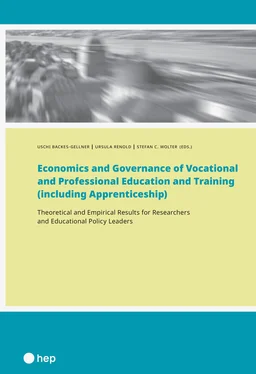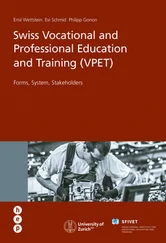Braun, M. (2006). Funktionale Aequivalenz in interkulturell vergleichenden Umfragen: Mythos und Realitaet . Mannheim: ZUMA.
Brockmann, M., Clarke, L., & Winch, C. (2009). Difficulties in recognising vocational skills and qualifications across Europe. Assessment in Education: Principles, Policy & Practice, 16 (1), 97–109. doi:10.1080/09695 940802704153
Buergin, A. (1993). Zur Soziogenese der politischen Oekonomie: Wirtschaftsgeschichtliche und dogmenhistorische Betrachtungen . Marburg: Metropolis-Verlag.
Busemeyer, M. R. (2009). Asset specificity, institutional complementarities and the variety of skill regimes in coordinated market economies. Socio-Economic Review, 7 (3), 375–406. doi:10.1093/ser/mwp009
Carron, G., & Carr-Hill, R. A. (1991). Non-formal education: Information and planning issues . Paris: International Institute for Educational Planning.
CEDEFOP. (2014). Terminology of European education and training policy . Luxembourg: Publications Office of the European Union. doi:10.2801/15877
CEDEFOP. (2018). What future for vocational education and training in Europe? Retrieved 13.12.2019 from http://www.cedefop.europa.eu/files/9133_en.pdf
Culpepper, P. D. (1999). The future of the high-skill equilibrium in Germany. Oxford Review of Economic Policy, 15 (1), 43–59. doi:10.1093/oxrep/15.1.43
DGIZ. (2016). Definitions of formal, informal and non-formal learning. Retrieved 15.9.2016 from https://www.giz.de/expertise/html/11954.html
DiFrisco, J. (2017). Functional explanation and the problem of functional equivalence. Studies in History and Philosophy of Biological and Biomedical Sciences, 65 , 1–8. doi:10.1016/j.shpsc.2017.06.010
DiMaggio, P., & Powell, W. W. (1983). The iron cage revisited: Collective rationality and institutional isomorphism in organizational fields. American Sociological Review, 48 (2), 147–60. doi:10.2307/2095101
Eichmann, R. (1989). Diskurs Gesellschaftlicher Teilsysteme: Zur Abstimmung von Bildungssystem und Beschaeftigungssystem . Wiesbaden: Deutscher Universitaets-Verlag.
Eshach, H. (2007). Bridging in-school and out-of-school learning: Formal, non-formal, and informal education. Journal of science education and technology, 16 (2), 171–190. doi:10.1007/s10956-006-9027-1
Finegold, D., & Soskice, D. (1988). The failure of training in Britain: Analysis and prescription. Oxford Review of Economic Policy, 4 (3), 21–53. doi:10.1093/oxrep/4.3.21
Fligstein, N. (2001). Social skill and the theory of fields. Sociological Theory, 19 (2), 105–125. doi:10.1111/0735-2751.00132
Freemann, C. (1995). The ‘national system of innovation’ in historical perspective. Cambridge Journal of Economics, 19 , 5–24. doi:10.1093/oxfordjournals.cje.a035309
Fuller, A., & Unwin, L. (2003). Creating a ‚modern apprenticeship‘: A critique of the UK’s multi-sector, social inclusion approach. Journal of Education and Work, 16 (1), 5–25. doi:10.1080/1363908022000032867
Grollmann, P. (2008). Comparative research on Technical and Vocational Education and Training (TVET): Methodological considerations. In Rauner, F., & Maclean, R. (eds.), Handbook of Technical and Vocational Education and Training Research (pp. 253–259). Berlin: Springer.
Hall, P. A., & Gingerich, D. W. (2009). Varieties of capitalism and institutional complementarities in the political economy: An empirical analysis. British Journal of Political Science, 39 (3), 449–482. doi:10.1017/s0007123409000672
Hall, P. A., & Soskice, D. (eds.). (2001). Varieties of capitalism. The institutional foundations of comparative advantage. Oxford: Oxford University Press.
Hancké, B., Rhodes, M., & Thatcher, M. (eds.). (2007). Beyond varieties of capitalism: Conflict, contradictions, and complementarities in the European economy. Oxford and New York: Oxford University Press. doi:10.1093/acprof:oso/9780199206483.001.0001
Hempel, C. G., & Oppenheim, P. (1948). Studies the logic of explanation. Philosophy of Science 15 (2), 135–175 (reprinted in Hempel, C. G. (1965). Aspects of scientific explanation and other essays in the philosophy of science (pp. 245–290). New York/London: Free Press).
Hoelliner, F., & Eder, A. (2016). Functional equivalence and validity of religiousness indicators in cross-cultural comparative surveys. Methodological Innovations, 9 , 1–12. doi:10.1177/2059799115622756
ILO. (2014). Skills mismatch in Europe, Statistic Brief . Retrieved 13.12.2019 from https://www.ilo.org/wcmsp5/groups/public/—-dgreports/—-stat/documents/publication/wcms_315623.pdf
Knorr-Cetina, K. (2002). Wissenskulturen: Ein Vergleich naturwissenschaftlicher Wissensformen . Frankfurt am Main: Suhrkamp.
Knorr-Cetina, K., & Harré, R. (2012). Die Fabrikation von Erkenntnis: Zur Anthropologie der Naturwissenschaft (Vol. 3). Frankfurt am Main: Suhrkamp.
Kohn, M. L., & American Sociological Association (Eds.). (1989). Cross-national research in sociology . American Sociological Association presidential series. Newbury Park: Sage Publications.
Krumme, J.-H. (2018). Berufsbildung. In Gabler Wirtschaftslexikon . Retrieved from https://wirtschaftslexikon.gabler.de/definition/berufsbildung-29275/version-252886
Kurz, H. D., & Sturn, R. (2013). Die groessten Oekonomen: Adam Smith . Konstanz: UVK.
Lerman, R. I. (2010). Apprenticeship in the United States: Patterns of governance and recent developments. In: Smith, E., & Rauner, F. (Eds.), Rediscovering apprenticeship (pp. 125–136). Dordrecht: Springer Netherlands.
Lerman, R. I. (2012). Can the United States expand apprenticeship? Lessons from experience. IZA Policy Paper No. 46.
List, F. (1991). The national system of political economy . New Jersey: Augustus Kelley.
Livingstone, D. W. (2009). Education and jobs: Exploring the gaps. Toronto: University of Toronto Press.
Lorenz-Spreen, P., Mønsted, B. M., Hoevel, P., & Lehmann, S. (2019). Accelerating dynamics of collective attention. Nature Communications, 10 (1). doi:0.1038/s41467-019-09311-w
Luhmann, N. (1991). Aufsaetze zur Theorie der Gesellschaft (4th ed., Vol. 2, Soziologische Aufklaerung, Niklas Luhmann). Opladen: Westdeutscher Verlag.
Luhmann, N. (1995). Social Systems . Translated by John Jr. Bednarz and Dirk Baecker. Stanford, CA: Stanford University Press.
Luhmann, N. (2009). Beitraege zur funktionalen Differenzierung der Gesellschaft, Soziologische Aufklaerung 4 . Wiesbaden: VS Verlag fuer Sozialwissenschaften.
Luhmann, N. (2010). “Nomologische Hypothesen”, funktionale Aequivalenz, Limitationalitaet: Zum wissenschaftstheoretischen Verstaendnis des Funktionalismus. Soziale Systeme, 16 (1), 3–27. doi:10.1515/sosys-2010-0102
Matthes, J. (1992). The operation called ‘Vergleichen’. In Matthes, J. (ed.), Soziale Welt (pp. 75–99). Goettingen: Schwartz.
Meltz, N. M. (1993). Industrial relations systems as a framework for organising contributions to industrial relations theory. In Adams, R., & Meltz, N. (eds.), Industrial Relations Theory . Metuchan, NJ: Institute of Management and Labor Relations Press.
Menger, K. (1928). Dimensionstheorie . Leipzig/Berlin: Teubner.
Meyer, J. W., & Rowan, B. (1991). Institutionalized organizations. Formal structure as myth and ceremony. In Powell, W. W., & DiMaggio, P. (eds.), The new institutionalism in organizational analysis (pp. 41–62). Chicago and London: University of Chicago Press.
Miller, S. (2019). Social institutions. The Stanford Encyclopedia of Philosophy (Summer 2019 Edition) (pp. 1–47).
Читать дальше












